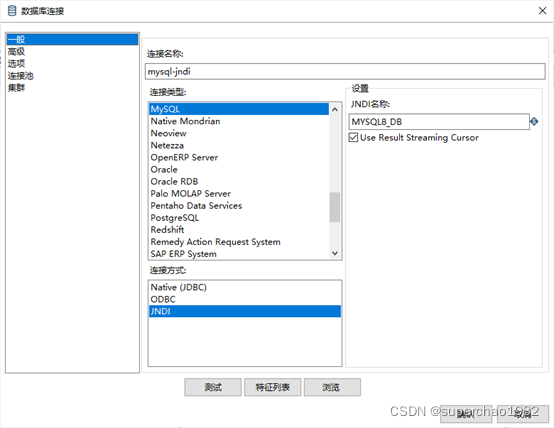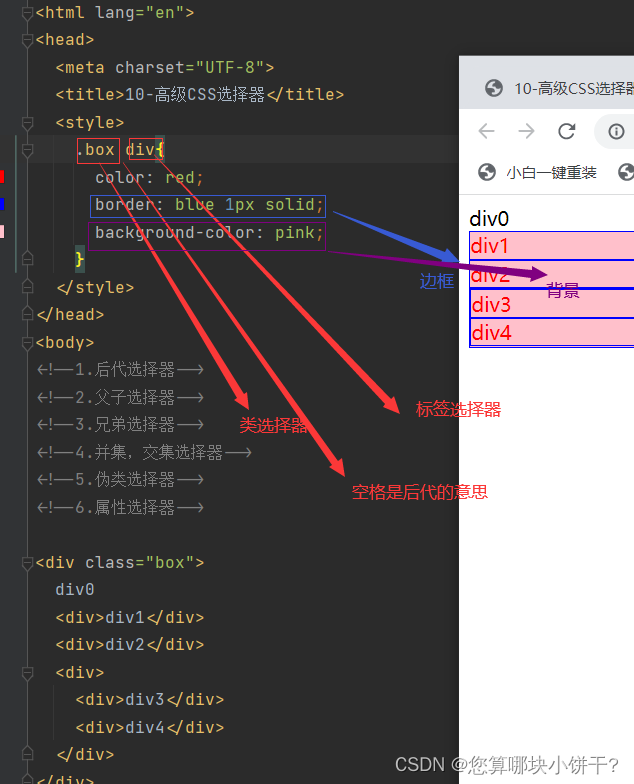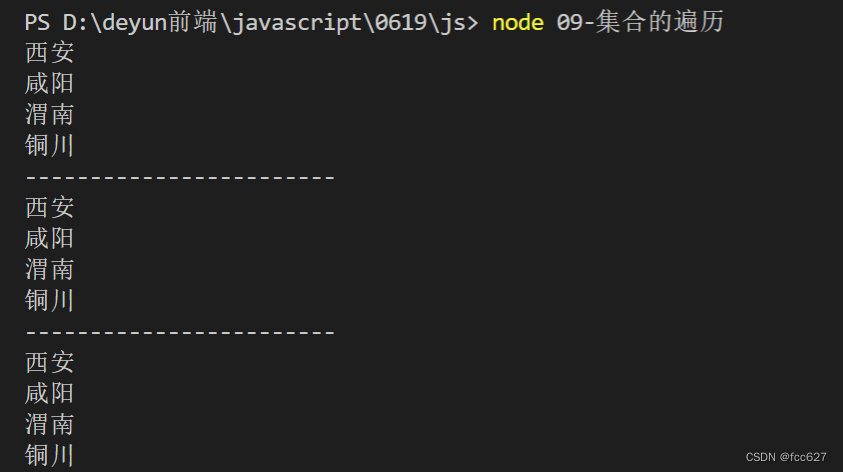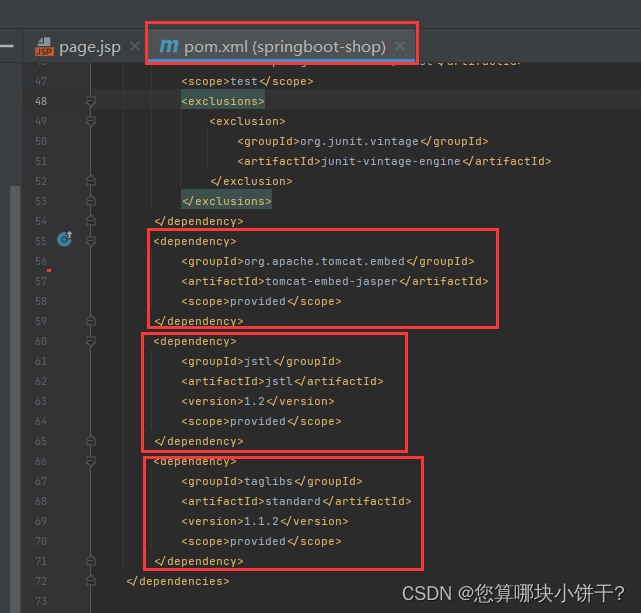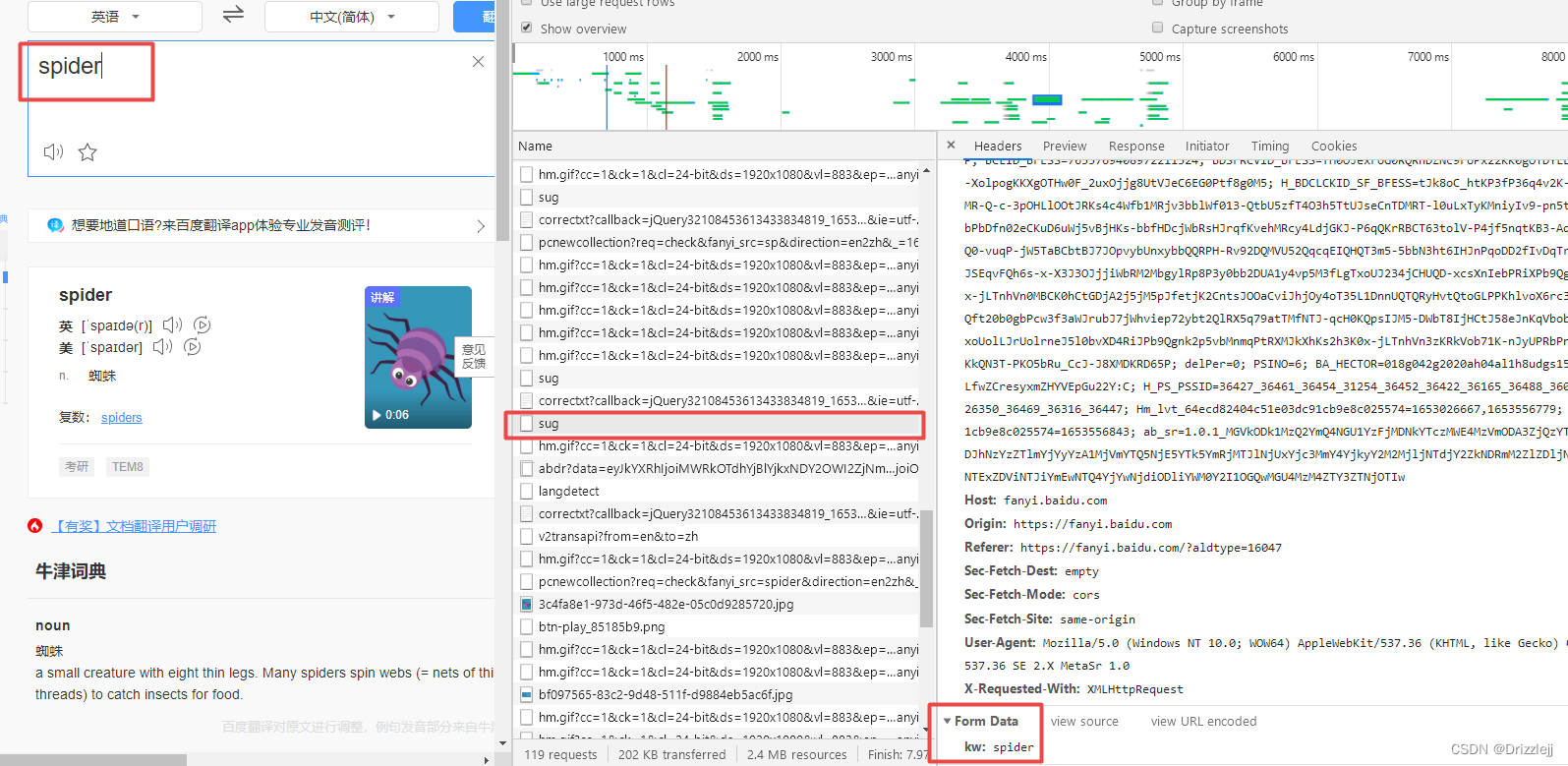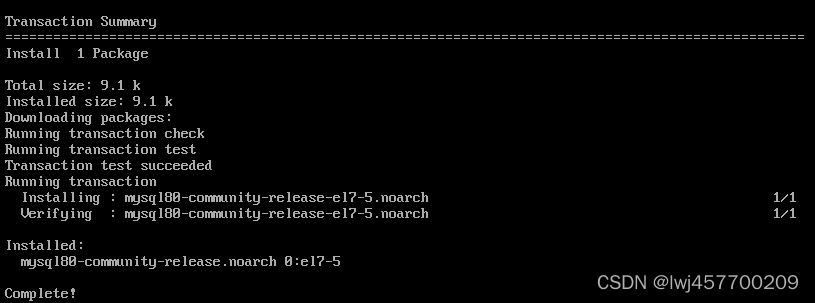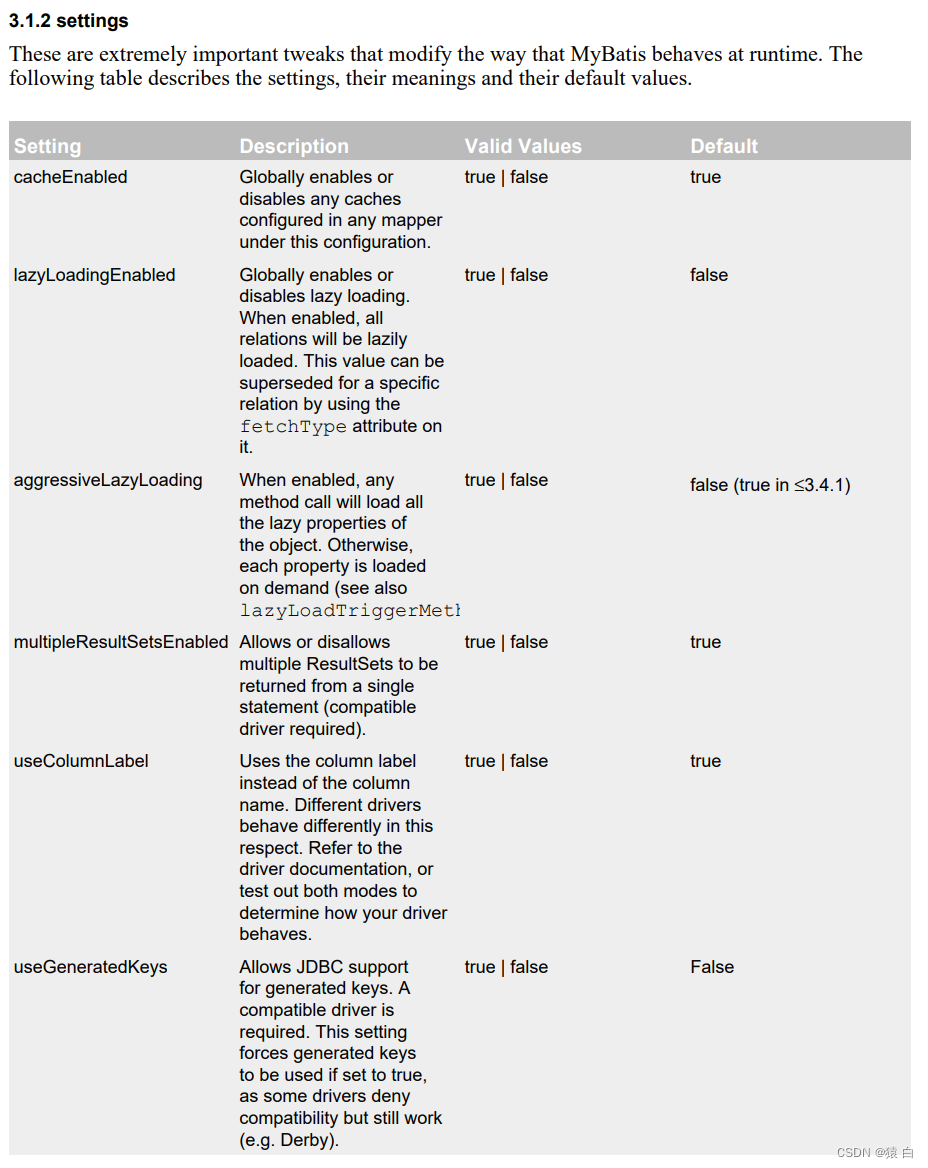当前位置:网站首页>自动化运维工具Ansible(1)基础
自动化运维工具Ansible(1)基础
2022-08-04 05:27:00 【AHui_CSDN】
Ansible基本概述
什么是Ansible?
Ansible是一个自动化统一配置管理工具,自动化主要体现在Ansible集成了丰富模块以及功能组件,可以通过一个命令完成一系列的操作,进而能减少重复性的工作和维护成本,可以提高工作效率。
同类型软件对比
1.puppet 学习难,安装ruby环境难,没有远程执行功能
2.ansible 轻量级,大规模环境下只通过ssh会很慢,串行的
3.saltstack 一般选择salt会使用C/S结构的模式,salt-master和salt-minion,并行的,大规模批量操作的情况下,会比Ansible速度快一些,底层使用的是zero-MQ消协队列
手动运维时代(原始社会)
在之前,我们学习了如何安装nginx。但是我们使用的是yum安装的方式,在以前,运维需要规范,需要统一配置管理,我们只能使用源码安装方式,便于我们去管理,源码安装,如果是单台还好,一会也就装完了,如果此时,生产环境压力骤增,需要扩展100台web节点(源码安装100台nginx)我们该如何操作?
重复以下步骤100遍???
#1.安装依赖
yum install pcre-devel openssl-devel -y
#2.进入安装目录
cd /usr/local/tools
#3.创建nginx用户
useradd nginx -M -s /sbin/nologin
#4.解压
tar xf nginx-1.6.3.tar.gz
#5.进入nginx程序目录
cd nginx-1.6.3
#6.生成
./configure --prefix=/usr/local/nginx-1.6.3 --user=nginx --group=nginx --with-http_ssl_module --with-http_stub_status_module
#7.编译
make
#8.安装
make install
#9.做软链接
ln -s /usr/local/nginx-1.6.3/ /usr/local/nginx
以上步骤还只是安装,那还要部署代码呢?修改配置文件?优化?启动?那还工作个毛线啊,一天啥也不用干了,就装nginx吧。
自动化运维时代

只需要一条命令,搞定100台集群
自动化运维工具的优势
Ansible的功能及优点
1.远程执行
批量执行远程命令,可以对多台主机进行远程操作
2.配置管理
批量配置软件服务,可以进行自动化方式配置,服务的统一配置管理,和启停
3.事件驱动
通过Ansible的模块,对服务进行不同的事件驱动
比如:
1)修改配置后重启
2)只修改配置文件,不重启
3)修改配置文件后,重新加载
4)远程启停服务管理
4.管理公有云
通过API接口的方式管理公有云,不过这方面做的不如saltstack.
saltstack本身可以通过saltcloud管理各大云厂商的云平台。
5.二次开发
因为语法是Python,所以便于运维进行二次开发。
6.任务编排
可以通过playbook的方式来统一管理服务,并且可以使用一条命令,实现一套架构的部署
7.跨平台,跨系统
几乎不受到平台和系统的限制,比如安装apache和启动服务
在Ubuntu上安装apache服务名字叫apache2
在CentOS上安装apache服务名字叫httpd
在CentOS6上启动服务器使用命令:/etc/init.d/nginx start
在CentOS7上启动服务器使用命令:systemctl start nginx
Ansible的架构
1、连接插件connection plugins用于连接主机 用来连接被管理端
2、核心模块core modules连接主机实现操作, 它依赖于具体的模块来做具体的事情
3、自定义模块custom modules根据自己的需求编写具体的模块
4、插件plugins完成模块功能的补充
5、剧本playbookansible的配置文件,将多个任务定义在剧本中,由ansible自动执行
6、主机清单inventor定义ansible需要操作主机的范围
最重要的一点是 ansible是模块化的 它所有的操作都依赖于模块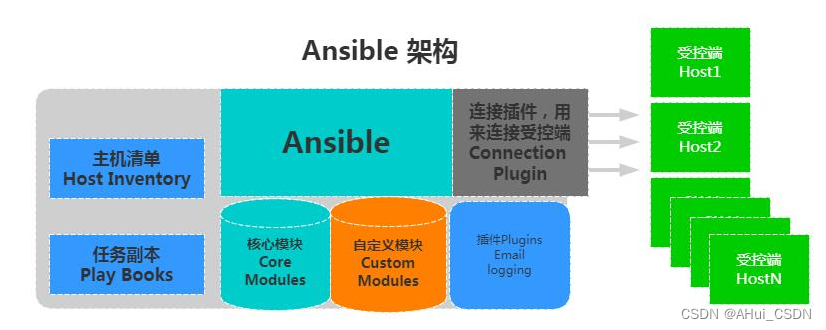
Ansible的执行流程
1.Ansible读取playbook剧本,剧本中会记录对哪些主机执行哪些任务。
2.首先Ansible通过主机清单找到要执行的主机,然后调用具体的模块。
3.其次Ansible会通过连接插件连接对应的主机并推送对应的任务列表。
4.最后被管理的主机会将Ansible发送过来的任务解析为本地Shell命令执行。
ansible [options]
–version #ansible版本信息
-v #显示详细信息
-i #主机清单文件路径,默认是在/etc/ansible/hosts
-m #使用的模块名称,默认使用command模块
-a #使用的模块参数,模块的具体动作
-k #提示输入ssh密码,而不使用基于ssh的密钥认证
-C #模拟执行测试,但不会真的执行
-T #执行命令的超时
Ansible安装与配置文件
环境准备
| 主机名 | wanIP | lanIP | 角色 |
|---|---|---|---|
| m01 | 10.0.0.61 | 172.16.1.61 | Ansible控制端 |
| web01 | 10.0.0.7 | 172.16.1.7 | Ansible被控端 |
| web02 | 10.0.0.8 | 172.16.1.8 | Ansible被控端 |
安装Ansible
1.安装epel源
[[email protected] ~]# wget -O /etc/yum.repos.d/epel.repo http://mirrors.aliyun.com/repo/epel-7.repo
2.安装Ansible
[[email protected] ~]# yum install -y ansible
3.查看Ansible版本及模块路径
[[email protected] ~]# ansible --version
ansible 2.7.1
config file = /etc/ansible/ansible.cfg
configured module search path = [u'/root/.ansible/plugins/modules', u'/usr/share/ansible/plugins/modules']
ansible python module location = /usr/lib/python2.7/site-packages/ansible
executable location = /usr/bin/ansible
python version = 2.7.5 (default, Apr 11 2018, 07:36:10) [GCC 4.8.5 20150623 (Red Hat 4.8.5-28)]
Ansible配置文件读取顺序
1、$ANSIBLE_CONFIG
2、./ansible.cfg
3、~/.ansible.cfg
4、/etc/ansible/ansible.cfg
[[email protected] ~]# vim /etc/ansible/ansible.cfg
# nearly all parameters can be overridden in ansible-playbook
# or with command line flags. ansible will read ANSIBLE_CONFIG,
# ansible.cfg in the current working directory, .ansible.cfg in
# the home directory or /etc/ansible/ansible.cfg, whichever it
# finds first
[[email protected] ~]# rpm -ql ansible
[[email protected] ~]# zcat /usr/share/man/man1/ansible-config.1.gz
#要查看完整列表,请访问https://docs.ansibe.com/或使用ansibe-config命令。
For a full list check \fI\%https://docs.ansible.com/\fP\&. or use the \fIansible\-config\fP command.
#/etc/ansible/ansible.cfg 配置文件,如果存在则使用
/etc/ansible/ansible.cfg \-\- Config file, used if present
#~/.ansible.cfg 用户配置文件,覆盖默认配置(如果存在)
~/.ansible.cfg \-\- User config file, overrides the default config if present
#\&/ansible.cfg 本地配置文件(在当前工作目录中)假定为(aqproject-specific)(aq,如果存在,则重写其余文件)。
\&./ansible.cfg \-\- Local config file (in current working directory) assumed to be \(aqproject specific\(aq and overrides the rest if present.
#如上所述,ANSIBLE_CONFIG环境变量将覆盖所有其他环境变量。
As mentioned above, the ANSIBLE_CONFIG environment variable will override all others.
Ansible配置文件详解
[[email protected] ~]# cat /etc/ansible/ansible.cfg
#inventory = /etc/ansible/hosts #主机列表配置文件
#library = /usr/share/my_modules/ #库文件存放目录
#remote_tmp = ~/.ansible/tmp #临时py文件存放在远程主机目录
#local_tmp = ~/.ansible/tmp #本机的临时执行目录
#forks = 5 #默认并发数
#sudo_user = root #默认sudo用户
#ask_sudo_pass = True #每次执行是否询问sudo的ssh密码
#ask_pass = True #每次执行是否询问ssh密码
#remote_port = 22 #远程主机端口
host_key_checking = False #跳过检查主机指纹
log_path = /var/log/ansible.log #ansible日志
#普通用户提权操作
[privilege_escalation]
#become=True
#become_method=sudo
#become_user=root
#become_ask_pass=False
Ansible Inventory
/etc/ansible/hosts是ansible默认主机资产清单文件,用于定义被管理主机的认证信息, 例如ssh登录用户名、密码以及key相关信息。Inventory文件中填写需要被管理的主机与主机组信息。还可以自定义Inventory主机清单的位置,使用-i指定文件位置即可。
场景一:基于密码连接
[[email protected] ~]# cat /etc/ansible/hosts
#方式一、IP+端口+用户+密码
[webs]
10.0.0.7 ansible_ssh_port=22 ansible_ssh_user=root ansible_ssh_pass='1'
10.0.0.8 ansible_ssh_port=22 ansible_ssh_user=root ansible_ssh_pass='1'
#方式二、主机名+密码
[webs]
web0[1:2] ansible_ssh_pass='123456'
#方式三、主机+端口+密码
[webs]
web0[1:2]
[webs:vars]
ansible_ssh_pass='123456'
使用指定hosts文件的方式测试
[[email protected] ~]# ansible webs -m ping -i ./hosts
10.0.0.8 | SUCCESS => {
"ansible_facts": {
"discovered_interpreter_python": "/usr/bin/python"
},
"changed": false,
"ping": "pong"
}
10.0.0.7 | SUCCESS => {
"ansible_facts": {
"discovered_interpreter_python": "/usr/bin/python"
},
"changed": false,
"ping": "pong"
}
场景二:基于密钥连接,需要先创建公钥和私钥,并下发公钥至被控端
创建秘钥对
[[email protected] ~]# ssh-keygen
推送公钥
[[email protected] ~]# ssh-copy-id -i ~/.ssh/id_rsa.pub [email protected]
[[email protected] ~]# ssh-copy-id -i ~/.ssh/id_rsa.pub [email protected]
方式一、主机+端口+密钥
[webs]
10.0.0.7:22
10.0.0.8
#使用测试
[[email protected] ~]# ansible webs -m ping -i ./hosts
10.0.0.8 | SUCCESS => {
"ansible_facts": {
"discovered_interpreter_python": "/usr/bin/python"
},
"changed": false,
"ping": "pong"
}
10.0.0.7 | SUCCESS => {
"ansible_facts": {
"discovered_interpreter_python": "/usr/bin/python"
},
"changed": false,
"ping": "pong"
}
方式二、别名+主机+端口+密钥
[webs]
web01 ansible_ssh_host=10.0.0.7 ansible_ssh_port=22
web02 ansible_ssh_host=10.0.0.8
#使用测试
[[email protected] ~]# ansible webs -m ping -i ./hosts
web02 | SUCCESS => {
"ansible_facts": {
"discovered_interpreter_python": "/usr/bin/python"
},
"changed": false,
"ping": "pong"
}
web01 | SUCCESS => {
"ansible_facts": {
"discovered_interpreter_python": "/usr/bin/python"
},
"changed": false,
"ping": "pong"
}
场景三:主机组使用方式
[[email protected] ~]# vim hosts
[db_group]
db01 ansible_ssh_host=10.0.0.51
db02 ansible_ssh_host=10.0.0.52
[web_group]
web01 ansible_ssh_host=10.0.0.7
web02 ansible_ssh_host=10.0.0.8
查看指定组内主机数量
[[email protected] ~]# ansible web_group -m ping -i ./hosts --list-host
hosts (2):
web01
web02
[[email protected] ~]# ansible db_group -m ping -i ./hosts --list-host
hosts (2):
db01
db02
#方式一、主机组变量+主机+密码
[db_group]
db01 ansible_ssh_host=10.0.0.51
db02 ansible_ssh_host=10.0.0.52
[db_group:vars]
ansible_ssh_pass='1'
#方式二、主机组变量+主机+密钥
[web_group]
web01 ansible_ssh_host=10.0.0.7
web02 ansible_ssh_host=10.0.0.8
#定义多组,多组汇总整合
# lnmp组包括两个子组[db,web]
[lnmp:children]
db_group
web_group
最终配置文件
[[email protected] ~]# cat hosts
[db_group]
db01 ansible_ssh_host=10.0.0.51
db02 ansible_ssh_host=10.0.0.52
[web_group]
web01 ansible_ssh_host=10.0.0.7
web02 ansible_ssh_host=10.0.0.8
[lnmp:children]
db_group
web_group
查看多组
[[email protected] ~]# ansible all -m ping -i ./hosts --list-host
hosts (4):
db01
db02
web01
web02
[[email protected] ~]# ansible lnmp -m ping -i ./hosts --list-host
hosts (4):
db01
db02
web01
web02
边栏推荐
猜你喜欢
随机推荐
12. Paging plugin
MySQL日志篇,MySQL日志之binlog日志,binlog日志详解
Can 't connect to MySQL server on' localhost3306 '(10061) simple solutions
JS basics - forced type conversion (error-prone, self-use)
CentOS7 - yum install mysql
TensorRTx-YOLOv5工程解读(二)
MySQL日期函数
基于C语言的学生信息管理系统_(更新版)_(附源码和安装包)_课程设计_**往事随風**的博客
Set集合与Map集合
编程Go:内置打印函数 print、println 和 fmt 包中 fmt.Print、fmt.Println 的区别
PHP解决字符乱码问题(多种编码转换)
webrtc中视频采集实现分析(一) 采集及图像处理接口封装
lambda函数用法总结
通过&修改数组中的值
Sublime Text 3 2021.8.3 个人配置
npm报错Beginning October 4, 2021, all connections to the npm registry - including for package installa
Linux环境下redis的下载、安装和启动(建议收藏)
谷粒商城-基础篇(项目简介&项目搭建)
Unity表格配置编辑工具
[原创]STL容器map和unordered_map性能,创建,插入,随机访问速度对比!
